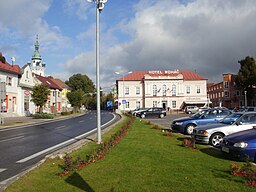Trstená
| Trstená, Slovakia | |
| Slovakia | |
| Town | |
|
M. R. Štefánik square, the main square of Trstená
|
|
| Country | Slovakia |
|---|---|
| Region | Žilina |
| Elevation | 607 m (1,991 ft) |
| Coordinates | 49°21′42″N 19°36′38″E / 49.36167°N 19.61056°ECoordinates: 49°21′42″N 19°36′38″E / 49.36167°N 19.61056°E |
| Area | 82.540 km2 (31.869 sq mi) |
| Population | 7,551 (2005-12-31) |
| Density | 91/km2 (236/sq mi) |
| First mentioned | 1371 |
| Mayor | Jozef Ďubjak |
| Timezone | CET (UTC+1) |
| - summer (DST) | CEST (UTC+2) |
| Postal code | 028 01 |
| Area code | +421-43 |
| Car plate | TS |
| Statistics: MOŠ/MIS | |
| Website: www.trstena.sk | |
Trstená (Hungarian Trsztena; Polish Trzciana; Middle German B[r]ingenstadt) is a town in Tvrdošín District, Žilina Region, central Slovakia.
Trstená is situated on the Orava River at the Orava (reservoir) in the Slovak part of the Orava valley, approximately 6 kilometres (4 miles) south of the Polish border. Its elevation is 607 m (1,991 ft). Trstená is surrounded by fields, hills, dense forests and the Tatra Mountains to the East. Nearby are thermal pools. The nearest international airport is Kraków in Poland. The city has rail and road transport.
In 1371, King Louis I of Hungary granted Ladislav Piasta of Opole, (Hungarian palatine and landlord of the Orava district), Schwankomir (Piasta's notary and brother in law), Jan Hertel, a relative of Schwankomir from Einseidel in Silesia (and his sons, Jakub and Martin) and Ladislav's brothers (Janko, Grimok, Junislav and Wismer) to establish a new town in the forest (from Zabiedov brook (Zadowa) to the Bukovina valley), near Tvrdošín (Wardossin). This new town was Trstená, a market town.
Jan Hertel and his descendants became the hereditary mayors ('advocati' or 'sculteti') of Trstená (initially Bingenstad). Hertel was allowed, even though he was not a nobleman, to establish a public bar, a slaughter house, a blacksmith's forgery, bakery, shops and toll houses. (Other bakers, publicans, shoemakers and craftsmen were excluded from the town). He was given the right to build mills anywhere near the Oravica brook, to mine and sell rock and to hunt and fish throughout the locale. Hertel was also made the local magistrate and tax collector. Trstená developed trade with Poland with goods such as salt, cloth and lead. Trstená also developed a strong potters' guild. Hertel's preferential treatment ensured his control of Trstená.
...
Wikipedia





